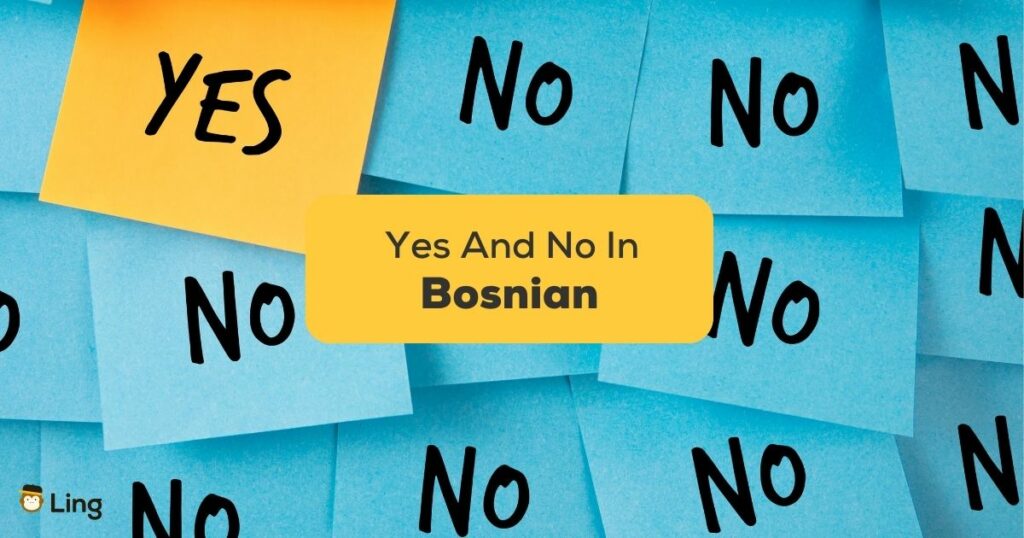Ever found yourself lost in translation while traveling abroad? I’ve been there, trust me! There’s nothing more bewildering yet thrilling than trying to navigate a conversation in a foreign language. That’s why I knew I was in for an adventure when I stumbled upon the intriguing task of learning how to say yes and no in Bosnian. In my native language, saying these can be as simple as uttering “oo” and “hindi,” but that is not true in Bosnian since it’s a totally different language. Ready to learn more about it? Read on below!
How To Say Yes In Bosnian Language
If you’re venturing into the beautiful lands of Bosnia and want to blend in with the locals, it’s time to master the art of saying “yes” in Bosnian.
Yes = “Da”
Simple, right? Just two letters, “d” and “a,” come together to form “da,” the Bosnian word for “yes.” Pronouncing “da” is almost like saying the English word “dah,” but with a slightly softer “d” sound. It’s smooth, flowing, and it’s got that uniquely Bosnian flair. Give it a try! Feel how it rolls off the tongue?
While “da” by itself is entirely appropriate, you can elevate your response by adding a polite “molim” (please) or addressing someone with a respectful title. It’s like adding a cherry on top of a sundae – just that extra touch of sweetness.
Other Ways To Say Yes In Bosnian
Just like a painter has various shades of color, the Bosnian language offers different nuances for saying “yes.” Each variation carries its unique flavor and can be used in different contexts. Whether you’re aiming for a formal acknowledgment or a casual agreement, here’s a list of alternative ways to say “yes” in Bosnian, perfect for making your conversation more vibrant and expressive.
| English | Bosnian |
|---|---|
| Yes | Da |
| Certainly | Naravno |
| Of course | Svakako |
| Absolutely | Apsolutno |
| Sure | Sigurno |
| Definitely | Definitivno |
| By all means | U svakom slučaju |
| Indeed | Doista |
| Agree | Slažem se |

How To Say No In Bosnian Language
Saying “no” can be a powerful tool. It sets boundaries, expresses preferences, and sometimes, it’s just the word we need to say. But how do you say “no” in Bosnian? Let’s dive into this essential part of communication and make sure you’re ready to navigate the Bosnian-speaking world with confidence and flair.
No = “Ne”
Unlike the many shades of “yes,” the Bosnian “no” is clear, crisp, and concise. It’s simply “ne.” Pronouncing “ne” is pretty straightforward. Think of it as the English “neh,” but a bit shorter and sharper. It’s like a gentle yet firm way of setting a boundary. Can you hear it in your head? Try saying it out loud! Saying “no” can sometimes feel harsh, but not in Bosnian! Add a polite “hvala” (thank you) afterward, and your “ne” becomes a graceful decline. It’s like saying “no, thank you” in English, but with a Bosnian twist.
According to the locals, if you want to make your “no” more emphatic? You can elongate the “e” sound, turning it into “neee.” It’s a playful way to add emphasis, perfect for casual conversations with friends.
Other Ways To Say No In Bosnian
Just like a fine wine has its distinct notes, the Bosnian language has varied and nuanced ways to say “no.” Depending on the context, the tone you want to set, or the level of politeness you wish to convey, you can choose from a delightful assortment of alternatives. Here’s a table to guide you through these variations, making your Bosnian interactions even more colorful and authentic.
| English | Bosnian |
|---|---|
| No | Ne |
| Certainly not | Nikako |
| Of course not | Naravno da ne |
| Not at all | Uopće ne |
| Never | Nikada |
| I disagree | Ne slažem se |
| I refuse | Odbijam |
| I don’t think so | Mislim da ne |

Why Learning How To Say Yes And No In Bosnian Is Important
You might be thinking, “It’s just two words, how crucial can they be?” Well, hold onto your hats because saying “yes” and “no” in Bosnian is more than just a casual nod or shake of the head. Let’s break it down.
1. Breaking Down Barriers
Imagine strolling through the vibrant streets of Mostar, the aroma of Ćevapi filling the air, and you suddenly want to try some. The catch? The vendor doesn’t speak English. That’s where your newfound Bosnian language skills come into play. By simply saying “da” (yes) or “ne” (no), you break down those intimidating language barriers, allowing you to savor not only the food but the experience itself.
2. Connecting With The Locals
Nothing warms the heart like a genuine connection with a local, and knowing how to say “yes” and “no” in Bosnian is like having a secret handshake. It opens doors to smiles, friendships, and those insider tips only locals know. Want the best view of the sunset or the coziest coffee shop? Knowing even these simple words can make all the difference.
3. Understanding The Culture
Saying “yes” and “no” in Bosnian isn’t just about communication; it’s about immersing yourself in a rich and beautiful culture. It’s about understanding the rhythm, the politeness, the way Bosnians express themselves. These two little words can be a gateway to a deeper appreciation of the people and their way of life.
4. Boosting Confidence In Traveling
Ever feel a bit nervous or out of place while traveling in Bosnia? I know I have. Learning how to say “yes” and “no” in Bosnian can be an instant confidence booster. It’s empowering to know that you can handle basic interactions, whether it’s bargaining at a market or agreeing to join a dance at a local festival.
Learn Bosnian With Ling
If you’re feeling inspired by these Bosnian expressions and want to dive deeper into the language, there’s an exciting way to expand your vocabulary! Simply download Ling, a user-friendly language-learning app designed to make mastering Bosnian both fun and effective. With engaging lessons and interactive exercises, Ling has everything you need to embark on a fulfilling linguistic journey.
Ready to say “da” to more Bosnian? Download it from the App Store or Play Store now!



































































